|
January | February
| March | April | May
| June | July
August | September | October
| November | December
January
January 7: Kudos to a Clean Car
The Sierra Club gives the first product award in its 108-year history
to the Honda Insight. The car, the first commercially available hybrid,
uses both a battery and a gasoline-powered motor to get a fuel-efficient
68 miles per gallon on the highway.
January 11: Monumental Victory
 |
President Clinton designates three national monuments
(Grand Canyon-Parashant and Agua Fria in Arizona, and California
Coastal on the state's coastline) and expands a fourth, Pinnacles
in California. |
January 12: Pollution Solution
The Sierra Club and co-plaintiffs win a U.S. Supreme Court victory,
Friends of the Earth v. Laidlaw Environmental Services. Laidlaw, a
hazardous-waste disposal outfit, had illegally and repeatedly dumped
mercury into a South Carolina river. The Supreme Court ruling, overturning
an appeals court decision that dismissed a lawsuit against the company,
reinforces the right of citizens to sue big polluters.
January 16: Keeping the Environment in Mind
A Gallup poll of 1,000 adults nationwide indicates that 70 percent
think "protection of the environment should be given priority,
even at the risk of curbing economic growth."
January 16: Mayor Meets Manatee
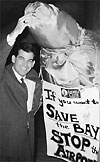 |
A manatee costume helps Florida Chapter activists
oppose Homestead Airport. Miami Mayor Alex Penelas grabs a photo
op, but ignores the message. |
February
February 4: No Fire Next Time
 |
In a huge environmental- justice victory, Henry
Ford Hospital in Detroit, Mich., shuts down its incinerator. Black
smoke had permeated the low-income neighborhood, triggering asthma
attacks. Making environmental justice a priority, the Club hired
four new organizers in 2000 - in Detroit, Memphis, Los Angeles
and Washington, D.C. - and plans to hire four more in 2001. |
February 8: Craving Rough Water
John Osborne, Northern Rockies Chapter conservation chair, dresses
as Captain William Clark to testify at a federal hearing in Spokane,
Wash., on whether to breach four dams on the Snake River.
February 25: Paying for Pig Poop
In a big win for the Cumberland (Kentucky) Chapter's campaign to
control factory farms, Gov. Paul Patton signs administrative regulations
that make the corporations that own livestock and determine how it
is raised liable for meeting environmental regulations. Previously,
contract growers - not the corporations they work for - were liable
alone.
March
March 1: Pitching Clean Air Junk Balls
 |
In response to Club ads blasting Texas Gov. George
W. Bush's toxics record, ads appear in New York, funded by a group
called "Republicans for Clean Air," lauding Bush as
a clean-air champion. "Praising George Bush on clean air
is like thanking John Rocker for his contribution for civil rights,"
responds Susan Holmes, the Club's New York regional representative. |
March 2: Reprieve for Gray Whales in Mexico
Mitsubishi and the Mexican government abandon plans to build a massive
industrial salt plant at Laguna San Ignacio, the last undisturbed
birthing and nursery grounds of the gray whale.
March 6: Wetland Win
The Army Corps issues replacement permits for Nationwide Permit 26,
which reduces from 3 acres to half an acre the size of a wetland that
can be filled or dredged without a permit. Robin Mann, the Club's
Wetlands Committee chair, calls it "a significant step forward."
March 22: Detailing Crude Behavior
 |
On the eve of the 10-year anniversary
of the Exxon Valdez oil spill in Alaska, the Club releases "Crude
Behavior," a report that details how petroleum corporations
and their congressional allies have contributed to America's dependence
on foreign
oil.
|
|
Photodisc
|
March 26: Too Soon to Bloom
The Washington Post reports that the famed cherry blossoms at the
nation's capitol are appearing a week earlier than 30 years ago, which
a Smithsonian study attributes to global warming - warmer winter and
spring nights.
April
April 6: Jailed Activist Gets Goldman
 |
Mexican forest activist Montiel Rodolfo
wins the Goldman Environmental Prize, which he receives in the
jail where he is being held. |
|
Photo courtesy of Prodh
|
April 13: The Price of Pavement
The sprawl campaign releases a spring report, "Sprawl Costs
Us All," detailing the taxes that subsidize and encourage unfettered
growth.
April 15: Big Hug for Big Trees
President Clinton sets aside 328,000 acres of sequoia forest in California
as the Giant Sequoia National Monument. Earlier in the month, the
Club presented Clinton with 600,000 postcards in favor of the designation.
April 20: Irons in the Political Fire
In recognition of Earth Day, the Cascade Chapter's "Ironing
Board Brigade" hits suburban stores in Washington. They're armed
with 5,000 fliers with tear-off postcards asking Sen. Slade Gorton
to protect water, forests and salmon in upcoming bills.
April 27: Snowmobiles Silenced
 |
The National Park Service bans snowmobiles
from everywhere except national parks in Alaska and the Voyageurs
National Park in Minnesota. The action was in response to a petition
by the Blue Water Network and 60 other groups that claimed the
Park Service ignored its own regulations and failed to monitor
the environmental effects of snowmobiling. |
|
Jeff Henry
|
May
May 9: Score One for the Spotted Owl
The Forest Service releases a plan for restoring the Sierra Nevada
mountains, with a focus on wildlife and recreation rather than logging.
Timber cutting would be even further reduced and grazing would be
slowed to help salmon runs and other populations to recover.
May 10: Go Play Outside
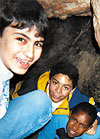 |
The Club's Youth in Wilderness program announces
its first round of grants, including one to the Seven Tepees Youth
Program, at right. In 2000, more than 155 schools and camps that
provide outdoor experiences and environmental education for youngsters
received a total of more than $2 million in funding. |
May 12: Bounty Hunting Returns to Minnesota
 |
The Minnesota Legislature passes a
bill that allows livestock owners to shoot a wolf if it's within
a mile of their property, and provides bounties of $150. |
|
National Park Service
|
May 14: Population Postcards
Just in time for Mother's Day, the Club's Population and the Global
Environment Campaign releases a postcard book, "Women's Health,
Earth's Health." Half the postcards are pre-addressed to decision-makers;
half are blank.
May 18: Score Another for Grizzlies and Bull Trout
The Northern Rockies Ecosystem Protection Act gathers its 100th co-sponsor
in the House, Rep. Albert Wynn (D-Md.). The bill would provide protection
for 20 million acres of land and 1,800 miles of river, protecting
water supplies and wildlife habitat.
May 30: Sprawl Takes a Fall in California
 |
Kern County Superior Court Judge Roger
D. Randall halts construction on the massive Newhall Ranch development
in Southern California until an environmental impact report is
conducted. The development is planned for the floodplain of the
Santa Clara River. |
Lynne Plambeck |
June
June 5: What a Waste
The Oklahoma Chapter files a lawsuit against Seaboard Corp., saying
a hog farm violated federal law when 160,000 gallons of wastewater
spilled near the Beaver River and over the Ogallala Aquifer.
June 7: Close Call for Utah Wilderness
 |
A dangerous bill that provided only
weak protection for Utah wilderness is pulled from the House floor
thanks to efforts by environmental leaders. |
Tom Till |
June 12: Roosevelt Rides Again
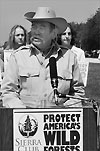 |
Teddy Roosevelt (actually, Club staffer Dean Whitworth
in disguise) paid a visit to the first Forest Service hearing
on the roadless initiative. The meeting in Asheville, N.C., was
swamped by citizens in Sierra Club green hats and stickers asking
for strong protection for wild forests. |
June 15: Jumpstart for Boost in Fuel Economy
The Senate orders a joint study by the Department of Transportation
and the National Academy of Sciences on increasing the fuel-efficiency
standards for cars and trucks. Their recommendation to Congress, due
by July 1, 2001, could finally lead to a long-overdue increase. The
auto industry and its congressional allies successfully fought any
increases for 25 years, but grassroots pressure finally made a difference.
July
July 11: Rock Stars Shine in Headwaters Case
After the Club sues to plug the "Hole in the Headwaters,"
a California judge halts the helicopter logging. But there's a catch:
the Club has to fork over a $250,000 bond. With a little help from
friends like Don Henley and Bonnie Raitt, the Club pays up.
July 17: Wild Commentary
 |
The deadline arrives for comments on the Forest
Service's roadless initiative. Approximately 1 million comments
flood the agency's offices, many from Club members demanding strong
protection for roadless areas. |
July 22: Gore, Gore, He's Our Man!
Citing Vice President Al Gore's record on issues like clean air and
global warming, the Club endorses him as its choice for president.
August
August 6: Where There's Smoke
 |
The worst wildfires in 50 years rage
through the Bitterroot Valley and other areas of the Rocky Mountains.
Club members help their neighbors defend against the flames by
clearing brush around homes. |
|
John McColgan, BLM, AK Fire Service
|
August 19: Come Together Now
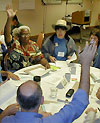 |
Group, chapter and national Club leaders
meet in Albuquerque, N.M., to smooth the Club's functioning at
all levels. |
|
Emily McFarland
|
September
September 12: Suit Seeks Goshawk Protection
The Grand Canyon (Arizona) Chapter of the Sierra Club sues the Forest
Service on behalf of the northern goshawk, saying that logging should
be stopped on 11 national forests in the Southwest that have goshawk
habitat. The bird prefers 80 percent canopy cover and mature and old
growth.
September 12: 50 Ways to Lose Your Sprawl
 |
The fall sprawl report "Smart Choices or Sprawling
Growth" is released, highlighting examples of irresponsible
development and smart growth in every state. |
September 13: Nikitin Acquittal Stands
 |
The presidium of the Russian Supreme
Court dismisses an appeal of the acquittal of environmental activist
Aleksandr Nikitin. The former Soviet submarine captain and nuclear
engineer was jailed for publishing public information about the
decaying nuclear-submarine fleet in Russia's North Sea. |
|
John Byrne Barry
|
September 18: Corn Concerns
When genetically engineered corn only approved for animal feed turns
up in Kraft's Taco Bell brand taco shells on grocery store shelves,
the Club asks the company to swear off genetically modified ingredients.
Over the course of the month, the corn turns up in another brand,
then another. Ultimately farmers admit they didn't even know they
were supposed to keep it separate.
September 27: Cloer Tapped for Top Volunteer Award
 |
Carla Cloer, a school teacher who fought for the
Giant Sequoia National Monument, receives the John Muir Award-the
Club's highest honor for volunteer activists. Other award-winners
include Rep. Maurice Hinchey (D-N.Y.) and Washington Post
reporter Michael Grunwald. |
October
October 3: The First Lady's Our First Choice
 |
The Club endorses Hillary Clinton in the New York
Senate race. Clinton makes cleaning up state waters a priority,
while opponent Rep. Rick Lazio votes against Utah wilderness. |
October 3: Magcorp Buckles Under
After a long fight, Magnesium Corporation, a heavy-duty polluter responsible
for 80 percent of the nation's chlorine emissions, signs an agreement
with the EPA to test for dioxin at its Utah plant. This is the first
step in a process that results in the company agreeing to install
updated technology, cut pollution by 90 percent and clean up dioxin-laden
ground.
October 12: Passage to Jordan
 |
Bruce Hamilton, the Club's conservation
director, is among staff, volunteers and Sierra Student Coalition
members who travel to Jordan for a meeting of the International
Union for the Conservation of Nature. |
|
Stephen Mills
|
October 27: La Verdad en Inglés y Español
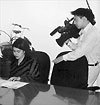 |
New Mexico EVEC organizer Alma Rosa Silva-Banuelos is interviewed
by a Spanish language television station about the Club's bilingual
voter- education program. The next day 50 volunteers fan out throughout
Albuquerque to distribute 8,500 voters guides with candidate information
in both English and Spanish. |
November
November 5: Brower Dies
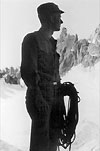 |
David Brower, the Club's first executive
director and former board member, dies at age 88. A rock climber
and wilderness enthusiast, he pushed hard for environmental protections
for more than 60 years. |
Sierra Club archives |
November 7: A Different Senate
On Election Day, there's no clear winner for president, but the Senate
gets greener, with the addition of at least three pro-environment
and pro-campaign-finance reform advocates, including Michigan Rep.
Debbie Stabenow and Florida's Bill Nelson.
November 14: A Park, Not a Parking Lot
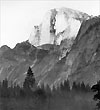 |
The Department of the Interior announces
a new management plan for Yosemite National Park, which scraps
plans for a large new parking lot and doesn't up the number of
pricey hotel rooms. "We are pleased to see that the Park
Service is putting a priority on saving Yosemite's natural beauty
and is planning less development in the Valley's fragile areas,"
says George Whitmore, chair of the Sierra Club's Yosemite Committee. |
Sierra Club archives |
November 24: Time for a Change
A climate change summit at The Hague is attended by Club volunteers
and members of the Sierra Student Coalition. All are disappointed
by the U.S. performance there.
November 30: Turtles and Teamsters, Take Two
 |
On the anniversary of the Seattle protests
at the World Trade Organization, John J. Sweeney, president of
the AFL-CIO, and Carl Pope, executive director of the Sierra Club,
right, declare plans to carry on the fight for global fairness.
|
Steve Kerkela |
December
December 1: Birds of a Feather
 |
At a Virginia retreat, representatives
of the Club's national campaigns come together to plan for the
next two years. They brainstorm, inventory resources and set goals.
And some dress up as big chickens. |
John Byrne Barry |
December 4: Coral Reefs Protected
The White House announces creation of the Northwest Hawaiian Islands
Coral Reef Ecosystem Reserve, an 84-million-acre underwater area that's
home to 70 percent of coral reefs in U.S. waters.
December 6: EPA to GE: Clean Up Your Mess
The Environmental Protection Agency orders General Electric to dredge
100,000 pounds of PCB-laden sediment from the Hudson River in New
York. In a massive public relations campaign, GE had insisted the
river was cleaning itself and that removal of the cancer-causing chemicals
wasn't necessary. Activists plan to rally to urge the company to begin
the cleanup.
December 7: So Long, Slade
 |
After a recount in a very close contest for the
U.S. Senate, Maria Cantwell is declared the winner over incumbent
Slade Gorton in Washington state. The Club, including Holly Forrest,
worked hard for a Cantwell victory. |
December 11: Florida Flourish
 |
President Clinton signs a bill providing $1.4 billion
to restore the imperiled Florida Everglades. The funding represents
the first installment toward a 30-year, $7.8 billion Army Corps
of Engineers plan. |
December 13: New Hope for Fair Trade
Environmental review is established as a component of future trade
agreements as President Clinton issues new guidelines. "Rigorously
implemented, these guidelines could go far to ease the tension between
trade and the environment," said Carl Pope, the Sierra Club's
executive director.
Up to Top
|